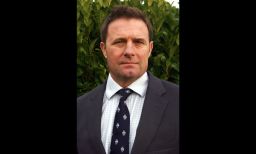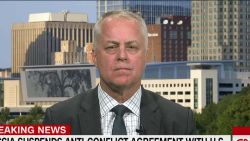Editor’s Note: Hamish de Bretton-Gordon, a former British army officer, is director of Doctors Under Fire, a campaign against attacks on hospitals in war zones. He is also the Chemical, Biological, Radiological and Nuclear adviser to the Union of Medical Care and Relief Organizations. The views expressed in this commentary are his own.
Story highlights
Last week, President Trump ordered a military strike against a Syrian airfield
Hamish de Bretton-Gordon: Strike was effective way to re-impose chemical weapons taboo shattered by international inaction in 2013
It is now clear that the deadly nerve agent sarin, the same agent which the Assad regime used to kill up to 1,500 people in East Ghouta near Damascus in August 2013, was used in the chemical attack on Idlib last week. As the Union of Medical Care and Relief Organizations Chemical, Biological, Radiological and Nuclear (CBRN) adviser during the incident last week, I can confirm that samples smuggled out to Turkey have proved positive for sarin, and I’m confident that samples that find their way to US and UK government laboratories will also test positive.
President Bashar al-Assad appears to use chemical weapons when he is in serious trouble or bogged down in a fight. The attack at East Ghouta saved the regime, as many believe it was about to be overrun by rebels in August 2013. Extensive use of chlorine in Aleppo in December 2016 broke an almost five-year siege, and the attack last week was to try to take Idlib, which has resisted throughout the civil war. President Trump’s targeting of the air base from which the Syrian Air Force jets took off was a reasonable, proportionate and effective way to re-impose a chemical weapons taboo so effectively shattered in 2013 by international inaction over the Ghouta chemical attack.

The numbers of those killed and injured (up to 100 people died and hundreds more were injured) suggest that a large amount of sarin was used, way beyond the capability of any al Qaeda groups who might have very small amounts of the agent. The most likely scenario is that Syrian jets dropped a number of bombs filled with the deadly agent.
Conspiracy theories that these jets targeted Al Nusrah ammunition dumps that were full of sarin are unrealistic, and the Russian government has recently distanced itself from this idea, urging an independent investigation into the incident.
Scientifically, when you blow up sarin, you destroy it. So while Syrian jets could have attacked an ammunition dump, they would have destroyed any sarin there – not created hundreds of chemical casualties.
The Russians must have been aware that the Syrian regime has been using chemical weapons, in particular chlorine barrel bombs dropped from helicopters. To not know this, when it was clear to the outside world, would be to suggest that Russian commanders are completely inept, which I highly doubt.
However, I do expect that last week’s chemical attack was a surprise to the Russians. Chlorine is one thing, but sarin, many times more deadly than chlorine, is another. President Putin is no fool and would realize that the new President of the United States would be good to his word to act if the chemical red line were crossed on his watch.
After the Ghouta attack in 2013, a joint effort by the US and Russia forced Syria to join the Chemical Weapons Convention (CWC), which then allowed the UN’s chemical watchdog, the Organization for the Prohibition of Chemical Weapons (OPCW), to come into Syria in 2014 and remove the regime’s stockpile of chemical weapons.
Views on the US strike in Syria
However, in October 2013, the Syrian regime declared its stockpile as 1,300 tons of mainly precursor chemicals, which when mixed become weaponized warefare agents, and only 16 tons of agent (in this case, mustard). At the time, most knowledgeable observers, myself included, believed the stockpile to be larger, around 1,500 tons – with 200 tons unaccounted for.
It was also strange that no sarin was declared, though a binary weapon – or mix of at least two precursors, had so recently been used at Ghouta.
There were rumors then that some of this missing stockpile fell into ISIS hands, and it is likely that the regime held back an amount of sarin and its precursors for use in times of trouble. Last week’s attack suggests this assumption could be correct.
President Trump’s response, in addition to clearly demarcating America’s commitment to not stand idly by when lines are crossed, has also delivered the best chance for a diplomatic and political settlement in Syria for many years.
If we are not to repeat the mistakes of the 2003 invasion of Iraq, the Permanent 5 member states of the UN Security Council (UK, US, France, Russia and China) must follow up on Trump’s actions with a determined effort to support the Geneva process, which is designed to produce a democratic solution to the Syrian civil war in the next 18 months. To support this process, the UN should be tasked to set up safe zones, protected by UN peacekeepers, to enable aid and begin reconstruction. With this in place, there is at least a glimmer of hope that the UN could enable Syria to get back on its feet.














